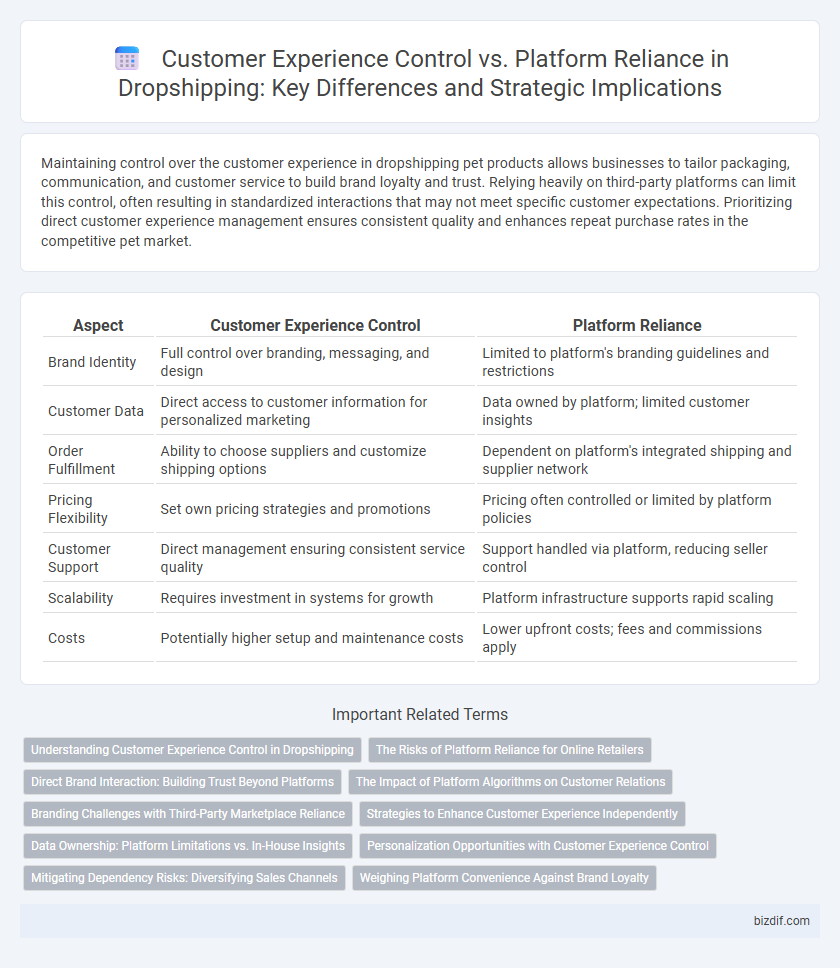Maintaining control over the customer experience in dropshipping pet products allows businesses to tailor packaging, communication, and customer service to build brand loyalty and trust. Relying heavily on third-party platforms can limit this control, often resulting in standardized interactions that may not meet specific customer expectations. Prioritizing direct customer experience management ensures consistent quality and enhances repeat purchase rates in the competitive pet market.
Table of Comparison
| Aspect | Customer Experience Control | Platform Reliance |
|---|---|---|
| Brand Identity | Full control over branding, messaging, and design | Limited to platform's branding guidelines and restrictions |
| Customer Data | Direct access to customer information for personalized marketing | Data owned by platform; limited customer insights |
| Order Fulfillment | Ability to choose suppliers and customize shipping options | Dependent on platform's integrated shipping and supplier network |
| Pricing Flexibility | Set own pricing strategies and promotions | Pricing often controlled or limited by platform policies |
| Customer Support | Direct management ensuring consistent service quality | Support handled via platform, reducing seller control |
| Scalability | Requires investment in systems for growth | Platform infrastructure supports rapid scaling |
| Costs | Potentially higher setup and maintenance costs | Lower upfront costs; fees and commissions apply |
Understanding Customer Experience Control in Dropshipping
Understanding customer experience control in dropshipping hinges on managing communication, packaging, and delivery timelines directly rather than relying solely on platform protocols. Direct control allows sellers to customize the buying journey, ensuring brand consistency and quicker responses to customer inquiries or issues. This hands-on approach enhances satisfaction and builds trust, leading to higher retention rates and positive reviews.
The Risks of Platform Reliance for Online Retailers
Relying heavily on platforms like Amazon or eBay exposes dropshipping retailers to significant risks such as sudden policy changes, account suspensions, and fee increases, which can disrupt sales and damage brand reputation. Limited control over customer data and user experience restricts the ability to personalize interactions and build long-term customer loyalty. Online retailers must balance platform benefits with building independent channels to ensure sustainable growth and risk mitigation.
Direct Brand Interaction: Building Trust Beyond Platforms
Direct brand interaction in dropshipping enhances customer experience control by allowing businesses to personalize communication, promptly address concerns, and establish a consistent brand voice. This approach reduces reliance on third-party platforms, fostering deeper trust and loyalty through transparent policies and tailored support. Building such relationships beyond marketplaces ensures long-term customer retention and differentiates the brand in a competitive dropshipping landscape.
The Impact of Platform Algorithms on Customer Relations
Platform algorithms significantly shape customer interactions by influencing product visibility and personalized recommendations, which directly affect conversion rates and customer satisfaction in dropshipping. Relying solely on these algorithms limits a seller's ability to tailor experiences and respond to unique customer needs, potentially reducing brand loyalty. Mastering customer experience control through independent communication channels and custom service strategies helps mitigate algorithmic constraints and fosters stronger, lasting customer relationships.
Branding Challenges with Third-Party Marketplace Reliance
Dropshipping businesses face significant branding challenges when relying on third-party marketplaces due to limited control over customer experience and presentation. Marketplaces often standardize product listings and restrict customization, diluting unique brand identity and reducing direct customer engagement. This dependence hinders building long-term brand loyalty and impedes differentiation in a crowded e-commerce landscape.
Strategies to Enhance Customer Experience Independently
Implementing direct communication channels such as chatbots and personalized email campaigns empowers dropshipping businesses to maintain customer experience control independently of third-party platforms. Leveraging proprietary tracking systems and customized delivery notifications enhances transparency and trust, reducing reliance on external marketplace interfaces. Fostering brand loyalty through exclusive offers and responsive support creates a seamless customer journey that distinguishes the business from platform-dependent competitors.
Data Ownership: Platform Limitations vs. In-House Insights
Dropshipping businesses face significant challenges with data ownership when relying on third-party platforms, as these platforms control critical customer information, limiting merchants' ability to gain deep insights and tailor marketing strategies. In-house data management empowers businesses to analyze buyer behavior, optimize inventory, and improve customer service based on proprietary analytics. Retaining control over customer experience through direct data access enhances personalization and fosters stronger brand loyalty compared to the constraints imposed by platform dependencies.
Personalization Opportunities with Customer Experience Control
Controlling customer experience in dropshipping enables tailored personalization opportunities that platform reliance often limits, allowing businesses to customize product recommendations, marketing messages, and user interfaces based on real-time customer data. Personalization increases customer engagement and loyalty by delivering relevant experiences aligned with individual preferences and purchase history. Leveraging customer experience control improves conversion rates and builds brand differentiation unattainable through standardized platform-driven settings.
Mitigating Dependency Risks: Diversifying Sales Channels
Mitigating dependency risks in dropshipping involves diversifying sales channels beyond reliance on a single platform like Shopify or Amazon. Expanding to multiple marketplaces, social media stores, and personal e-commerce sites enhances control over customer experience and reduces the impact of platform policy changes or outages. Strategic channel diversification ensures consistent revenue streams and empowers brand identity management.
Weighing Platform Convenience Against Brand Loyalty
Dropshipping merchants must balance the convenience of relying on established platforms with the need to maintain control over customer experience to build brand loyalty. Platforms like Amazon or Shopify simplify order fulfillment and access to customer bases but can limit customization and direct customer interaction. Prioritizing customer experience control fosters stronger brand identity and repeat purchases, while overdependence on platforms risks commoditization and reduced customer retention.
Customer Experience Control vs Platform Reliance Infographic

 bizdif.com
bizdif.com